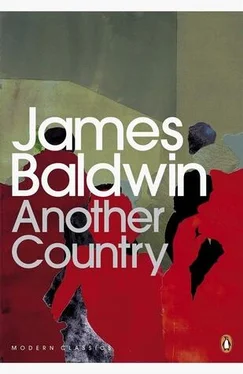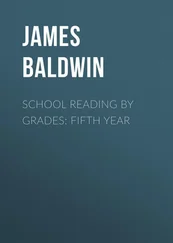He wished he had not come. He was afraid of seeing Vivaldo, he was afraid of meeting Ida; and he began to feel, standing helplessly in the center of this sweltering mob, unbearably odd and visible, unbearably a stranger. It was not a new sensation, but he had not felt it for a long time: he felt marked, as though, presently, someone would notice him and then the entire mob would turn on him, laughing and calling him names. He thought of leaving, but, instead, inched into the bar and ordered a drink. He had no idea how he would go about finding Ida or Vivaldo. He imagined that he would have to wait until she began to sing. But, presumably, they would also be watching for him, for his red hair.
And he sipped his drink, standing uncomfortably close to a burly college boy, unpleasantly jostled by the waiter, who was loading his tray next to him. And he was, indeed, beginning to attract a certain, covert attention; he did not look American, exactly: they were wondering how to place him.
He saw them before they saw him. Something made him turn around and look out through the door, to the sidewalk; and Ida and Vivaldo, loosely swinging hands, walked up and began talking to the musicians. Ida was wearing a tight, white, low-cut dress, and her shoulders were covered with a bright shawl. On the little finger of one hand, she wore a ruby-eyed snake ring; on the opposite wrist, a heavy, barbaric-looking bracelet, of silver. Her hair was swept back from her forehead, piled high, and gleaming, like a crown. She was far more beautiful than Rufus and, except for a beautifully sorrowful, quicksilver tension around the mouth, she might not have reminded him of Rufus. But this detail, which he knew so well, caught him at once, and so did another detail, harder, for a moment, to place. She laughed at something said by one of the musicians, throwing her head back: her heavy silver earrings caught the light. Eric felt a pounding in his chest and between his shoulder blades, as he stared at the gleaming metal and the laughing girl. He felt, suddenly, trapped in a dream from which he could not awaken. The earrings were heavy and archaic, suggesting the shape of a feathered arrow: Rufus never really liked them . In that time, eons ago, when they had been cufflinks, given him by Eric as a confession of his love, Rufus had hardly ever worn them. But he had kept them. And here they were, transformed, on the body of his sister. The burly college boy, looking straight ahead, seemed to nudge Eric with his knee. Eric moved a little out from the bar and moved nearer the door, so that they would see him when they looked his way.
He stood sipping his drink in the bar; they stood on the twilit sidewalk. Eric watched Vivaldo and used these moments to remember him. Vivaldo seemed more radiant than he had ever been, and less boyish. He was still very slim, very lean, but he seemed, somehow, to have more weight. In Eric’s memory, Vivaldo always put one foot down lightly, like a distrustful colt, ready, at any moment, to break and run; but now he stood where he stood, the ground bore him, and his startled, sniffing, maverick quality was gone. Or perhaps not entirely gone: his black eyes darted from face to face as he spoke, as he listened, investigating, weighing, watching, his eyes hiding more than they revealed. The conversation took a more somber turn. One of the musicians had brought up the subject of money — of unions, and, with a gesture toward the spot where Eric stood, of working conditions. Vivaldo’s eyes darkened, his face became still, and he looked briefly down at Ida. She watched the musician who was speaking with a proud, bitter look on her face. “So maybe you better give it another thought, gal,” the musician concluded. “I’ve thought about it,” she said, looking down, touching one of the earrings. Vivaldo took this hand in his, and she looked up at him; he kissed her lightly on the tip of the nose. “Well,” said another musician, wearily, “we better be making it on in.” He turned and entered the bar, saying, “Excuse me, man” to Eric as he passed. Ida whispered something in Vivaldo’s ear; he listened, frowning. His hair fell over his forehead, and he threw his head back, sharply, with a look of annoyance, and saw Eric.
For a moment they simply stared at each other. Another musician, entering the bar, passed between them. Then, Vivaldo said, “So there you are. I didn’t really believe you’d make it; I didn’t really believe you’d be back.”
“But I’m here,” said Eric, grinning, “now, what do you think of that?”
Vivaldo suddenly raised his arms and laughed — and the policeman moved directly behind him, glowering, seeming to wait for an occult go-ahead signal — and covered the space between himself and Eric and threw both arms around him. Eric nearly dropped the glass he was holding, for Vivaldo had thrown him off balance; he grinned up into Vivaldo’s grinning face; and was aware, behind Vivaldo, of Ida, inscrutably watching, and the policeman, waiting.
“You fucking red-headed Rebel,” Vivaldo shouted, “you haven’t changed a bit! Christ, I’m glad to see you, I’d no idea I’d be so glad to see you.” He released Eric, and stepped back, oblivious, apparently, to the storm he was creating. He dragged Eric out of the bar, into the street, over to Ida. “Here’s the sonofabitch we’ve been talking about so long, Ida; here’s Eric. He’s the last human being to get out of Alabama.”
The policeman seemed to take a dim, even a murderous view of this, and, ceasing to wait on occult inspiration, peered commandingly into the bar. The signal he then received caused him, slowly, to move a little away. But Vivaldo beamed on Eric as though Eric were his pride and joy; and said again, to Ida, staring at Eric, “Ida, this is Eric. Eric, meet Ida.” And he took their hands and placed them together.
Ida grasped his hand, laughing, and looked into his eyes. “Eric,” she said, “I think I’ve heard more about you than I’ve ever heard about any living human being. I’m so glad to meet you, I can’t tell you. I’d decided you weren’t nothing but a myth.”
The touch of her hand shocked him, as did her eyes and her warmth and her beauty. “I’m delighted to meet you, too,” he said. “You can’t have heard more about me — you can’t have heard better about me — than I’ve heard about you.”
They held each other’s eyes for a second, she still smiling, wearing all her beauty as a great queen wears her robes — and establishing that distance between them, too — and then one of the musicians came to the doorway, and said, “Ida, honey, the man says come on with it if you coming.” And he disappeared.
Ida said, “Come on, follow me. They’ve got a table for us way in back somewhere.” She took Eric’s arm. “They’re doing me a favor, letting me sit in. I’ve never sung in public before. So I can’t afford to bug them.”
“You see,” said Vivaldo, behind them, “you got off the boat just in time for a great occasion.”
“You should have let him say that,” said Ida.
“I was just about to,” said Eric, “believe me.” They squeezed through the crowd to the slightly wider area in the back. Here, Ida paused, looking about her.
She looked up at Eric. “What happened to Richard and Cass?”
“They asked me to apologize for them. They couldn’t come. One of the kids was sick.”
He felt, as he said this, a faint tremor of disloyalty — to Ida: as though she were mixed up in his mind with the colored children who had attacked Paul and Michael in the park.
“ Today of all days,” she sighed — but seemed, really, scarcely to be concerned about their absence. Her eyes continued to search the crowd; she sighed again, a sigh of private resignation. The musicians were ready, attempts were being made to silence the mob. A waiter appeared and seated them at a tiny table in a corner next to the ladies’ room, and took their order. The malevolent heat, now that they were trapped in this spot, began rising from the floor and descending from the ceiling.
Читать дальше












